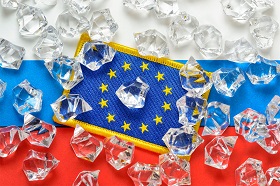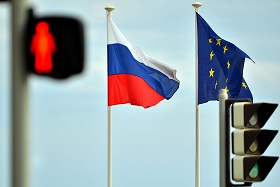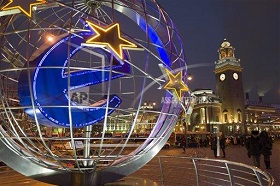On February 23, 2016 the European General Court (EGC) in Luxembourg started hearings in the so-called sanctions case of Russia’s OJSC Rosneft against the EU Council. What role does this case play in the EU’s system for sanctions policy? When and why was the lawsuit filed? What are the prospects for its consideration amidst the sanctions war between the West and Russia?
The basic principles of the anti-Russian sanctions policy of the EU
In 2014, following the aggravation of the political situation in Ukraine, the European Union imposed a number of sanctions against Russia, which can be divided into three groups: sanctions targeted against individuals and entities through travel bans and asset freezes imposed in March 2014; sanctions against Crimea and Sevastopol, imposed in June 2014; and anti-Russian economic (sectoral) sanctions against entire sectors of the country’s economy, which were imposed in July 2014 and substantially reinforced in September of the same year.
Economic sanctions against Russia included restrictions on the supply of goods and technologies for the defense and oil industries, as well as restrictions in the financial sector.
To specify its restrictive measures, the European Union defined a list of key Russian companies in its regulatory enactments that would suffer from the policy. As such, the sanctions list included the Russian companies Sberbank, VTB, Gazprombank, Rosneft, Gazprom Neft, Transneft, Uralvagonzavod, United Aircraft Corporation, among others.
In accordance with these procedures, EU sanctions (restrictive measures) have been imposed through the adoption of two types of regulatory legal acts: a decision by the EU Council, which is compulsory for all EU member states, and an EU Council regulation that has direct force and is compulsory for all citizens and corporate entities.
The key regulatory legal acts for imposing the economic sanctions are the Council Decision 2014/512/CFSP of July 31, 2014 and the Council Regulation 833/2014 of July 31, 2014 with subsequent amendments and additions (the sanctions acts of the EU Council).
The enactments establishing the sanctions are to be applied immediately after their publication, but the current EU legislation provides for the possibility of contestation in courts at the request of the interested parties. Such requests should be tried by the European General Court, which is the Court of First Instance in the EU judicial system.
The large Russian companies on the sanctions list took advantage of this opportunity and lodged an appeal with the European General Court for the invalidation of the EU Council acts concerning restrictive measures against them.
At this juncture, the European General Court is hearing several cases concerning Russian companies, while the case of Rosneft is in a class of its own.
Rosneft vs. EU Council: Positions in Action
On October 9, 2014, Rosneft filed a lawsuit at the European General Court claiming to annul a number of provisions of the EU Council sanctions acts (Case Т-715/14). However, apart from this, Rosneft's lawyers decided to bring an action for judicial review in the English courts against the relevant departments of state.
In November 2014, Rosneft filed a lawsuit at the High Court of Justice of England and Wales against Her Majesty’s Treasury, Secretary of State for Business, Innovation & Skills and the Financial Conduct Authority.
The acts that the British authorities adopted pursuant to the EU Council sanctions regulations were the reason for bringing the matter before the court.
To comply with the above-mentioned EU Council sanctions regulations, the UK authorities have adopted a number of national acts imposing criminal liability on anyone making transactions contrary to the anti-Russian prohibitions and restrictions in the EU regulation, in particular, the Export Control (Russia, Crimea and Sevastopol Sanctions) Order 2014, which provides for severe penalties for violating the anti-Russian legislation, including imprisonment.
Rosneft believes that the criminal penalties imposed by the British authorities for violating the sanctions regulations are an unacceptable measure, due to doubts surrounding the interpretation of certain concepts set out in the EU sanctions regulations.
In particular, the matter at issue are the concepts of “shale” and “waters deeper than 150 meters”. According to the claimant, these terms are broad-stroked and the lack of uniformity in their interpretation violates the principle of legal certainty and legality of criminal offenses.
The concepts of “financing” and “financial assistance” engendered argument as well. In accordance with the EU Council sanctions regulations, it is prohibited without prior permission not only to supply Russia with goods intended for scavenger oil extraction, but also to provide technical and financial assistance in respect of the supply of these goods.
British officials claim that “financing and financial assistance,” in addition to grants, loans and export credit insurance, include the processing of a payment by a bank or other financial institution. Oil Company Rosneft, in turn, contests this interpretation and believes that the UK authorities have unreasonably and widely interpreted the provisions in question.
Another dispute turns on the issue of Global Depository Receipts (GDRs) in respect to Rosneft shares. According to representatives of Rosneft Oil Company, the UK's Financial Conduct Authority misconstrued the regulation, depriving minority shareholders of the possibility of putting their shares up for sale in the form of GDRs.
Taken together, having filed a lawsuit at the High Court in London, Rosneft is challenging the legality of not just the British authorities’ actions, but the legitimacy of the EU sanctions per se.
Having considered the arguments of the parties, the High Court in London has ruled that a reference for a preliminary ruling be made to the EU Court of Justice for clarification on the application of the controversial sanction acts.
In accordance with Article 267 of the Treaty on the Functioning of the European Union, any court or tribunal of an EU Member State may submit to the Court of Justice of the EU a prejudicial inquiry on the validity and interpretation of acts of the institutions, bodies, offices or agencies of the Union. The London High Court decided to exercise this particular right.
This “maneuver” allowed the British court to shift the responsibility for making decisions on such a sensitive issue onto the judicial bodies of the EU.
This request is subject to review by the Court of Justice, the highest court in the European Union in matters of the European law. The High Court in London made reference for a preliminary ruling of the EU Court on February 18, 2015 (Case C-72/15), and the ruling is to be made by a Grand Chamber of 15 judges. The questions that the British court put before the Court of Justice can be divided into three groups and are as follows:
- Does the Court of Justice have jurisdiction to give a preliminary ruling on the validity of the EU instruments adopted in the field of common foreign and security policy?
- Is one or more of the provisions (“the Relevant Measures”) of the EU Regulation and the Decision invalid? Furthermore, is it contrary to the principles of legal certainty and nulla poena sine lege certa (there exists no crime and no punishment without a pre-existing penal law appertaining) for a member state to impose criminal penalties for violating anti-Russian sanctions?
- How should a number of provisions of sanctions acts of the European Council by interpreted? Does the term “financial assistance” include the processing of a payment by a bank or other financial institution? What is the correct interpretation of the terms “shale” and “waters deeper than 150 meters?”
During the hearing in the court of the EU on February 23, 2016, the representative of Rosneft Oil Company supported a line of defense which boils down to the following key arguments.
- The imposed sanctions hurt Rosneft Oil Company, rather than the Russian Federation.
- Rosneft Oil Company is not a military company and should not be held responsible for the actions of the Russian authorities.
- Rosneft Oil Company is part-owned not only by Russia, Russian individuals and companies, but by foreigners as well, so the scale of sanctions is unreasonably extended, affecting EU companies, including Britain's BP (British Petroleum).
- By imposing anti-Russian sanctions, the EU Council has exceeded its powers. In addition, the sanctions adopted by the acts are at variance with Article 52 of the Partnership and Cooperation Agreement between the European Communities and their Member States, of the one part, and the Russian, of the other part [1], which guarantees the freedom of movement of capital and payments between Russia and the EU.
- The activities of Rosneft Oil Company have nothing to do with the situation in Ukraine. In compliance with Article 296 of the Treaty on the Functioning of the European Union, specifying that “legal acts shall state the reasons on which they are based,” the EU Council should have provided sufficient evidence for its action when imposing tight restrictions on Rosneft. In other words, the EU Council had failed to substantiate why Rosneft was held accountable for the situation in Ukraine.
As a conclusion, the representative of Rosneft passed an opinion that the EU pursued the goal of doing harm to the Russian energy sector, so sanctions against the company, in fact, had nothing to do with the Russian policy towards Ukraine. According to the Russian company, the imposed sanctions are inherently unjust and unprecedented.
Rosneft’s opponents consider the sanctions measures adopted by the EU Council lawful and well-grounded. Referring to Article 99 of the current Partnership and Cooperation Agreement with Russia, they argue that nothing prevents a Party from taking measures necessary to protect its essential security interests.
Moreover, Rosneft’s opponents argue that the EU Court has no right to handle this legal matter on the reference for a preliminary ruling of the British court.
The point is that the sanctions acts were adopted within the framework of the Union’s common foreign policy, and the Court of Justice powers are very limited in this sphere. Therefore, a number of legal experts point out the impossibility of considering prejudicial requests about acts, adopted by the EU Council in the sphere of foreign policy.
Also, the defense team (UK) supported the main arguments put forward earlier in the London High Court. In particular, its representatives emphasized that a significant percentage of Rosneft shares is owned by Russia, so the sanctions against the company have a direct impact on Russia and thereby produce the desired effect.
The case of Rosneft is unique for several reasons. This is the first time that the issue of sanctions is being considered within the framework of a special prejudicial procedure at the request of a national court. In addition, the questions addressed to the Court cover the problem of understanding the term “financial assistance” and whether processing of a payment by a bank or other financial institution falls in the above category of assistance. There is no consensus among the EU member states on this issue: Germany favors a narrow interpretation of the term (the disputed payments are made through German banks), while France insists on regarding all financial transactions as prohibited.
There is little doubt that the reference of the London High Court for a preliminary ruling of the Court of Justice is favorable for Rosneft, as it allows the speeding up of the procedure for contesting the sanctions and sets a legal precedent for similar cases.
The EU’s current legislation provides for a rather complicated procedure of conducting court cases.
A hearing is preceded by a written stage of the proceedings, during which the parties exchange written documents and present their case.
The written stage is followed by the oral stage, during which the parties present their position in action at court hearings. Upon completion of the latter an Advocate General is given time to prepare an independent and impartial opinion concerning the case. And only after do the judges pass their judgment and start finalizing it. That being said, the final decision on this case is expected by August-September 2016.
The outcome of the case is difficult to predict.
Political and legal consequences of the EU Court’s disposition of the Rosneft case
The case will be of great significance not only for Rosneft and other Russian companies in the sanctions list, but for the established practice in applying the law in the European Union.
In addition, Case C-72/15 court decision will exert direct influence on other sanctions cases initiated by Russian companies in the European General Court.
The Court will have to give answers to many questions related to the Council’s adoption of sanctions regulations, as well as to hand down an opinion on the sufficiency or insufficiency of the grounds for including specific Russian companies in the sanctions list, which the EU Council neglected to do when adopting its decisions.
It should be noted that the Court will not consider the central issue, that is why the EU blames Russia for the Ukrainian crisis and how substantiated its accusations are, as the issues of foreign and security policy are beyond the jurisdiction of the Court [2].
Therefore, in any case, whatever the decision of the Court, it will not dramatically change the sanctions policies of the EU. Even a favorable for Rosneft ruling of the Court is unlikely to make EU politicians lift the existing sanctions against Russia.
It should be borne in mind that the sanctions contested in court are in force only until July 31, 2016. Nominally, their being in place depends upon the implementation of the Minsk agreements, which, given the current political situation in Ukraine, are unlikely to be implemented before this date. This means that in the summer of 2016 European politicians will again have to convince each other of the need to extend anti-Russian economic sanctions, while doing so becomes harder all the time.
In this regard, it is noteworthy that passing case C-72/15 judgment and considering the issue of extending sanctions on Russia will take place at about the same time.
But the trial per se will undoubtedly make the EU institutions more circumspective when adopting such decisions. Should the judgment be positive for Rosneft Oil Company, it will deliver a serious blow to the sanctions policy of the EU towards Russia, improve the position of Russian companies and, finally, set the stage for restoring economic contacts between Russia and the European Union.
1. Partnership and Cooperation Agreement between the European Communities and their Member States, of the one part, and the Russian Federation, of the other part, was signed in Corfu on June 24, 1994.
2. V. Voinikov. EU’s Restrictive Measures against Russia: Legal Aspects and Implementation Problem. The Baltic Region Scientific Journal, #1, 2015








